Fellowship rates
The stipend is competitive by international standards and offers broad benefits including health care and pension.
Unique in the world and waiting for you!
The EMBL International PhD Programme (EIPP) provides state-of-the-art training to its students, featuring a good balance between theory and practice, individual mentoring and creative freedom as well as teamwork and early independence. The average duration of a PhD thesis at EMBL is around 4 years. EMBL predoctoral fellowships are initially awarded for 3.5 years, with the possibility of a half-year extension. During their time at EMBL, fellows profit from outstanding laboratory and research facilities and enjoy close mentoring by highly qualified scientists.
In addition to the direct supervision by the respective Group/Team Leader, each EMBL PhD student has a Thesis Advisory Committee (TAC), consisting of the primary EMBL supervisor, two other EMBL advisors and a chosen university advisor. They jointly guide the student during the thesis work. Students meet with their TAC members annually as outlined below.
After the first TAC meeting, students enrol with their chosen university according to the respective procedures. Thesis submission and thesis defense are also regulated by the university.
The following timeline presents the structure and requirements of the EIPP at a glance:
The stipend is competitive by international standards and offers broad benefits including health care and pension.
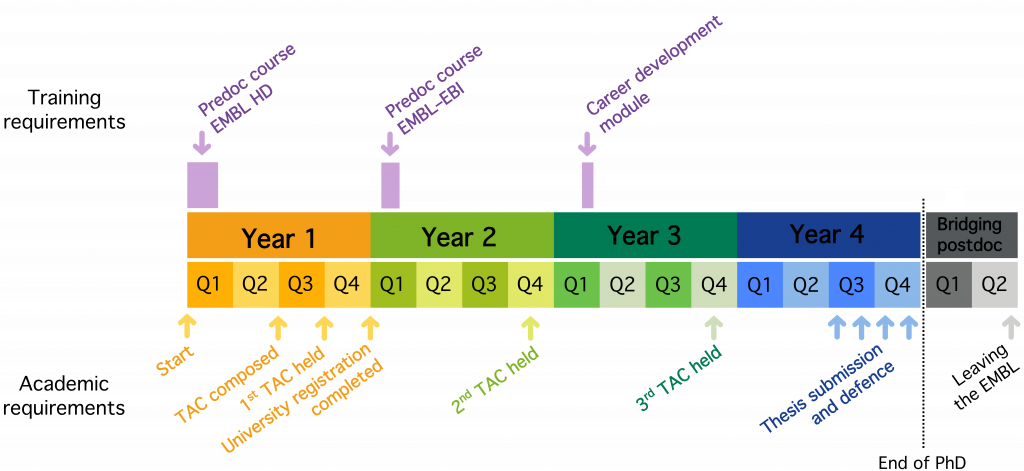
EMBL students are required to register with a university of their choice, which will award the PhD degree. Students may also obtain a ‘Joint PhD degree’ from EMBL and one of our partner universities across Member States, which is based on EMBL’s authority to grant its own PhD degree.
EMBL’s training programmes span both breadth and depth, supporting the development of our students, so that they are able to realise their full potential. In addition to the excellent scientific training fellows receive in the laboratories, they benefit from the EIPP Curriculum, which consists of a set of mandatory core courses, a wide range of career development workshops as well as optional training activities.
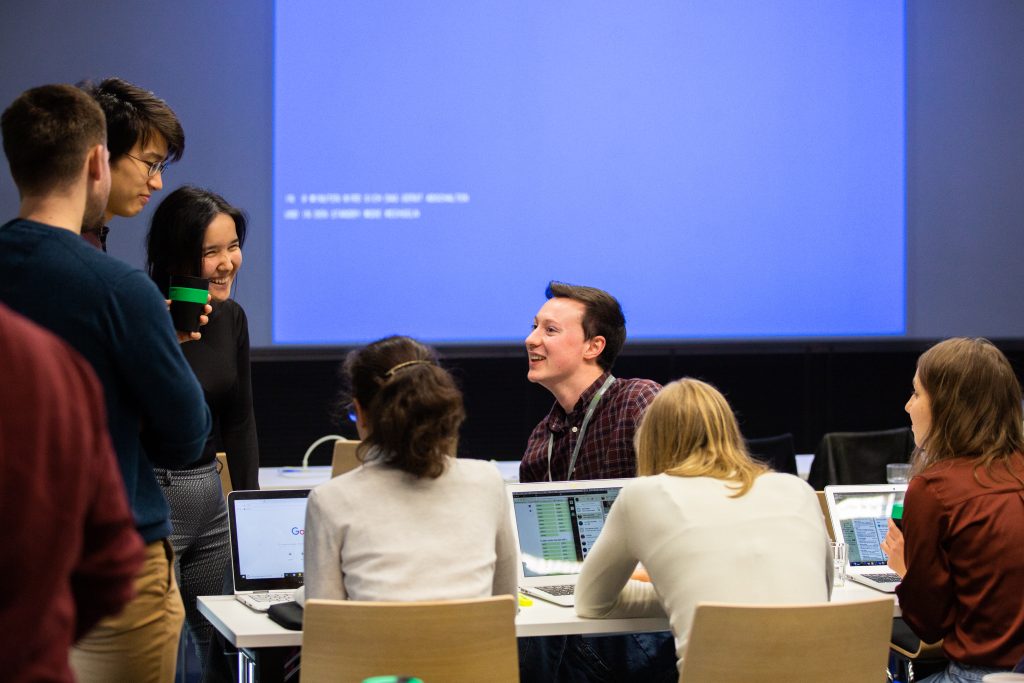
All EIPP students attend a nine-week Core Course in Molecular Biology, organised in the first year at EMBL Heidelberg; and a one-week Bioinformatics Course, organised during the second year at EMBL-EBI. In their third year, students benefit from a Career Development module. This provides students with broad interdisciplinary training (both theoretical and practical), class cohesion and networking opportunities across EMBL sites.
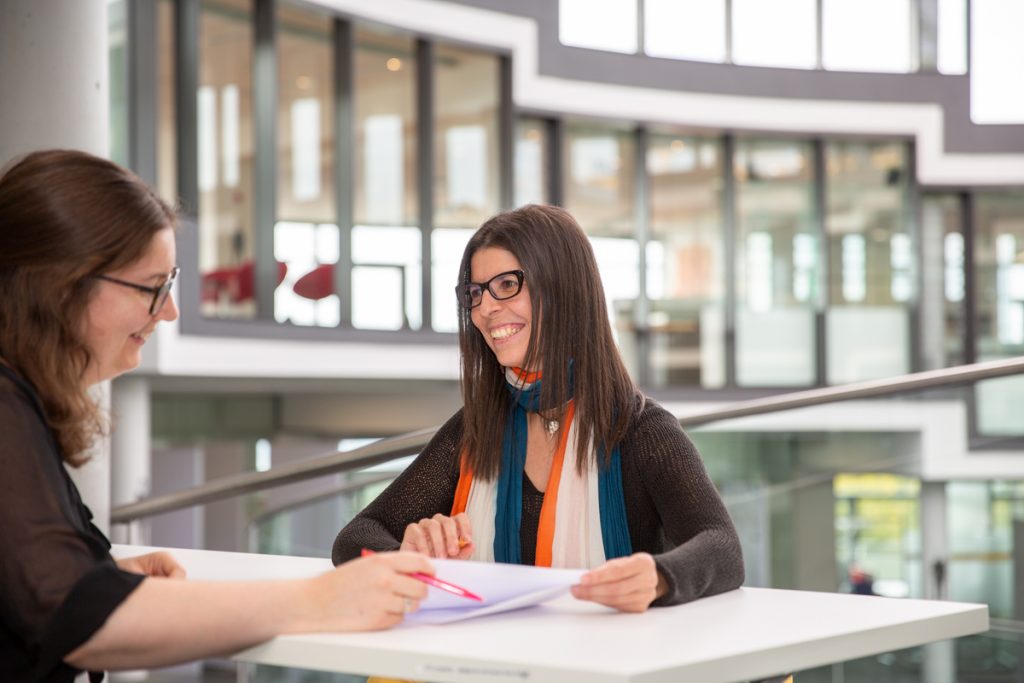
PhD students are encouraged to participate in additional training according to their needs and interests by taking advantage of the courses offered by the EMBL Fellows’ Complementary Skills and the Professional Development & Training Programme (Intranet link for staff members only). In order to prepare fellows for their next career steps, the EMBL Fellow’s Career Service offers a comprehensive set of workshops and webinars, as well as individual career guidance.
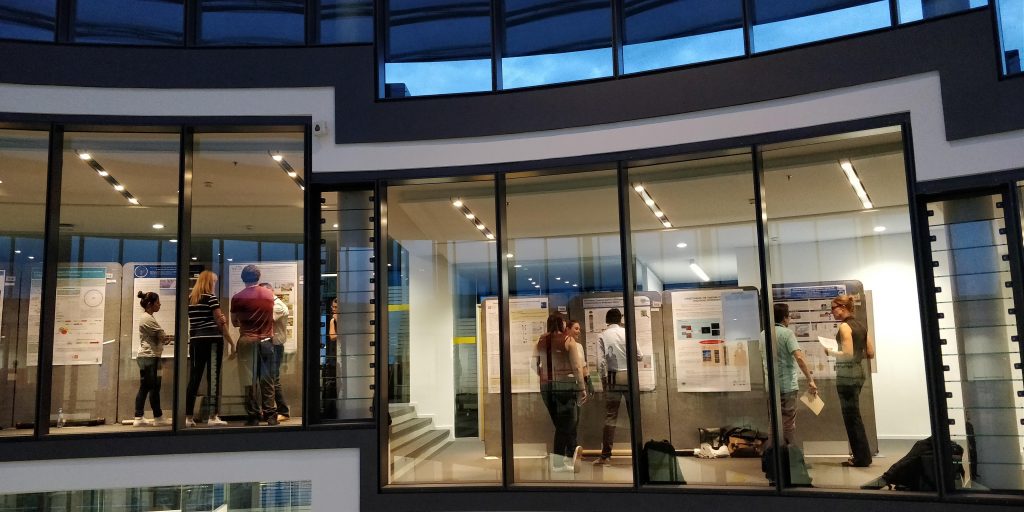
Our students enjoy plenty of opportunities to develop hands-on transferable skills by participating in the organisation of PhD symposia and retreats, or by engaging in public outreach activities and teaching. They are also invited to contribute to EMBL’s committees to represent the predoc community and to shape the future of the programme. EMBL is committed to support students in reaching their professional aims by providing access to EMBL Courses and Conferences as well as by encouraging students to attend international conferences.
The EMBL International PhD Programme (EIPP) provides comprehensive interdisciplinary training, maintaining a careful balance between theory and practice, close mentoring and creative freedom, collaborative teamwork and independence. Would you like to learn more? Read below what our students value about pursuing a PhD at EMBL.
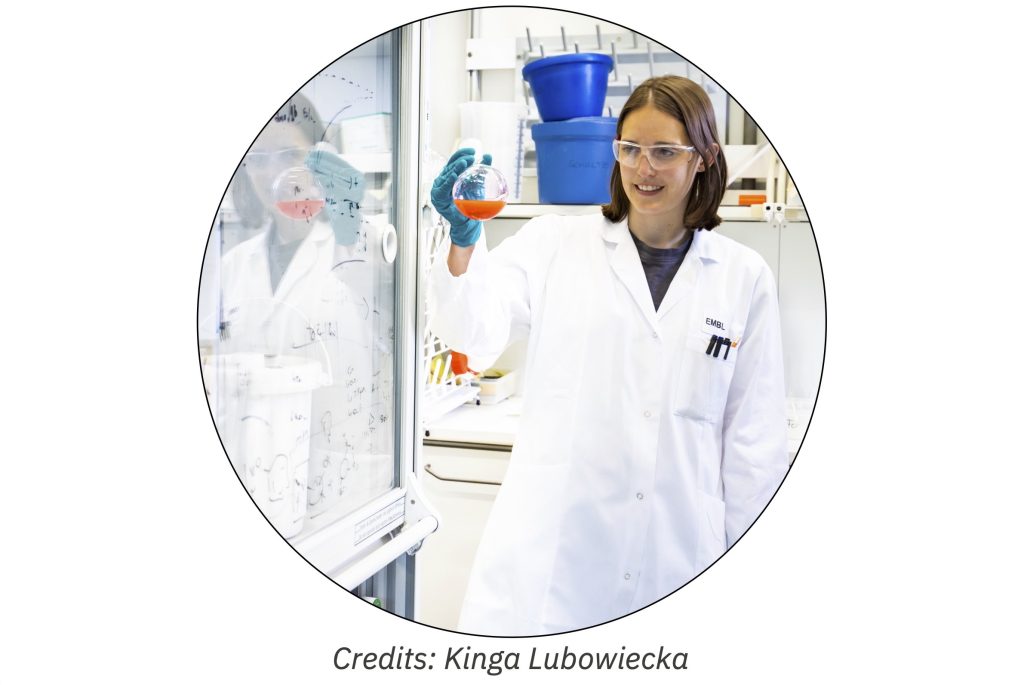
I applied to EMBL because I was highly interested in working in a multicultural and interdisciplinary environment during my PhD…
Franziska Walterspiel
Predoctoral Fellow in Deo Group, EMBL Heidelberg – Cell Biology and Biophysics Unit
(Background in Chemistry)
During my chemistry studies, I had heard of EMBL from my friends who specialised in biochemistry – they described it as a great place for biological research. However, during my masters’ thesis, I discovered that EMBL had more to offer than just biological research groups. I applied to EMBL because I was highly interested in working in a multicultural and interdisciplinary environment during my PhD, and joined the group of Claire Deo. It is incredible to see how my molecule goes from the flask to cellular applications, and that it can all happen within this one institute.
In the EIPP, I have the chance to meet people from all over the world. In addition to learning about science and harnessing different backgrounds to do great research, EMBL gives you the possibility to combine science with a cultural trip around the world. During my PhD so far, I have had the chance to step out of my chemistry-related comfort zone and learn about biochemistry and microscopy, and not only in theoretical terms. At EMBL, the focus is always on hands-on training to make you as independent as possible.
Multiple reasons make it a great place: (i) EMBL is the institute to start collaborations since people from many different backgrounds are working together here, benefiting from each other, (ii) EMBL offers a motivated and respectful environment between PIs and students, allowing them to work together and discuss any research questions which pop up, and (iii) EMBL offers a lot of possibilities for your scientific and personal development.
So, don’t hesitate and apply!
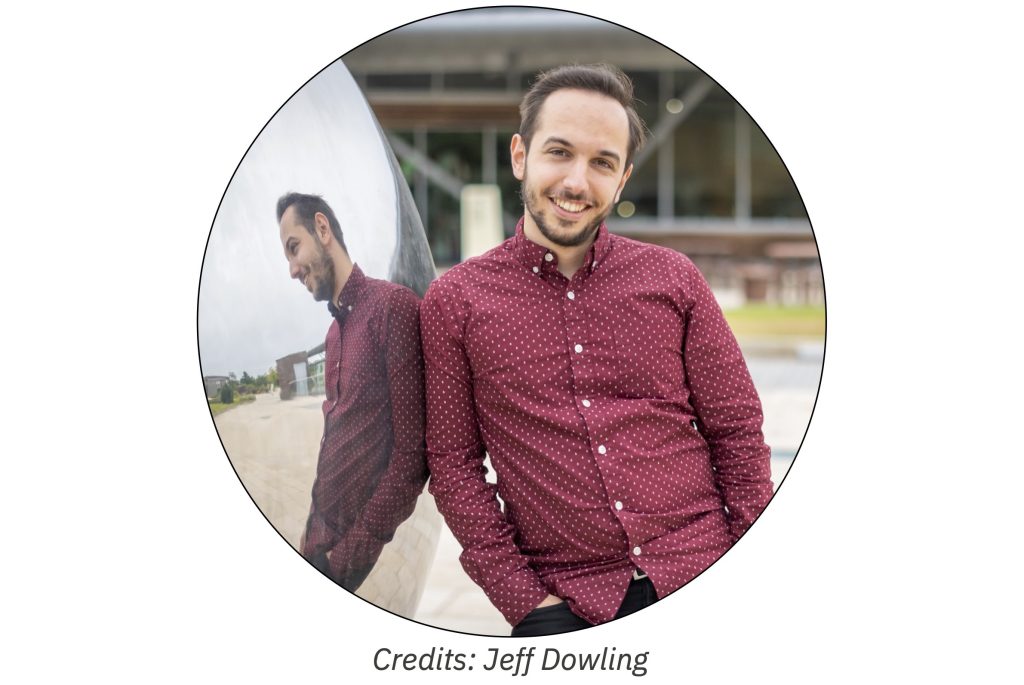
If you want to be in a scientifically stimulating environment that also values your needs as a person, I think EMBL is a great place for this.
Saul Pierotti
Predoctoral Fellow in Birney Group, EMBL-EBI, Hinxton
(Background in Bioinformatics)
My decision to join the EMBL PhD Program was influenced by how international the program is, the many resources available at EMBL-EBI that I use in my daily work (Uniprot, Pfam, PDBe, etc.), and the presence of Group Leaders with a research interest aligned to mine. Being part of the PhD Program instead of just being associated with a research group was also a big plus. I believe that a structured program can provide more opportunities for personal and professional interactions with other students and a safety net in case of conflicts during the PhD.
The work culture at EMBL-EBI is supportive and collaborative, and strongly promotes networking opportunities with PhD students across EMBL sites. For example, the predoc course at the beginning of the PhD is a great opportunity for understanding what other groups are doing at EMBL and whom you can contact when you need help with a scientific problem. Many retreats and events are organised throughout the year, which are not mandatory but are a great chance to put your research into context and expand your network.
If you want to be in a scientifically stimulating environment that also values your needs as a person, I think EMBL is a great place for this. The application process is intense but also a formative experience, irrespective of the outcome. I recommend you to be yourself and get the most out of it.
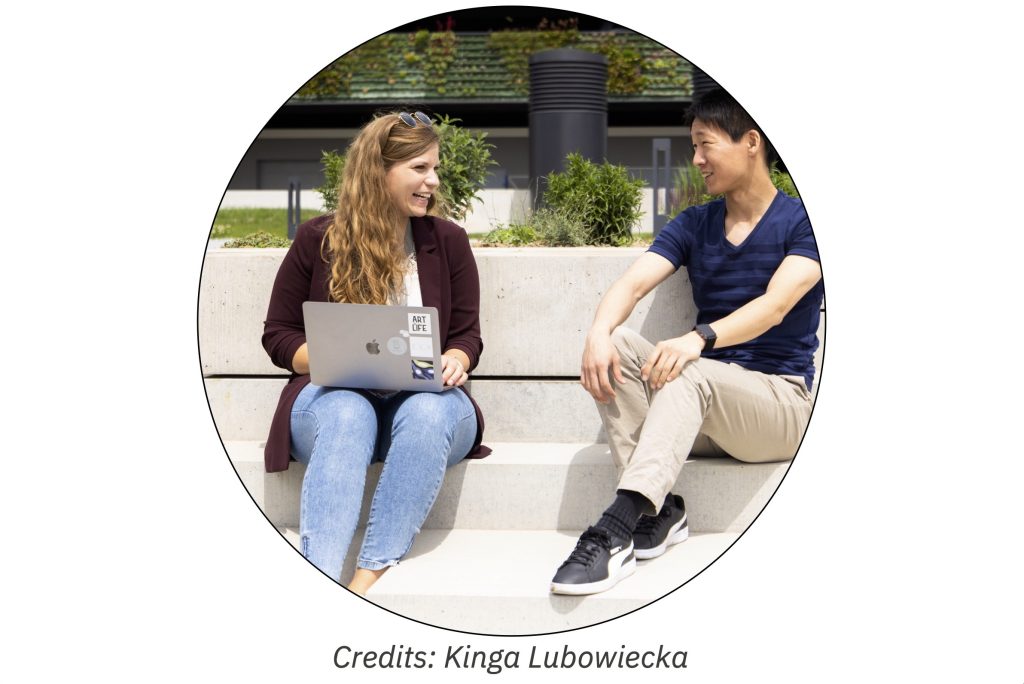
The EMBL PhD program offers a lot of frameworks for a successful PhD. […] The diversity of people teaches about different cultures and makes EMBL a truly international institute, while the diversity of research topics and methods contributes to fruitful collaboration.
Marisa Keller
Predoctoral Fellow in Bork Group, EMBL Heidelberg – Structural and Computational Biology Unit
(Background in Molecular Biosciences)
The first time I visited EMBL, before I even started studying biology, was at an open day. Being in the privileged situation of having grown up near Heidelberg, I have known EMBL for a long time. I don’t remember much about the open day, but I do remember the feeling I had when I got a glimpse into research and the life of a researcher. That feeling contributed a lot to my ambition to become a scientist.
I applied for the EMBL PhD program because I found research groups and scientists I wanted to learn from, and who work on my absolute favourite topic: the microbiome. In my opinion, that should be the main aspect when choosing your PhD project. The most important thing is that what you do arouses your own curiosity, and that the tools and methods you use give you joy in your everyday work.
Although pure enthusiasm is an important foundation, it cannot be the only one, of course. The EMBL PhD program offers a lot of frameworks for a successful PhD. The many different kinds of diversity at EMBL contribute to this. The diversity of people teaches about different cultures and makes EMBL a truly international institute, while the diversity of research topics and methods contributes to fruitful collaboration. I feel that there is nothing you can’t do at EMBL because there is always someone who can help you. All you have to do is ask.
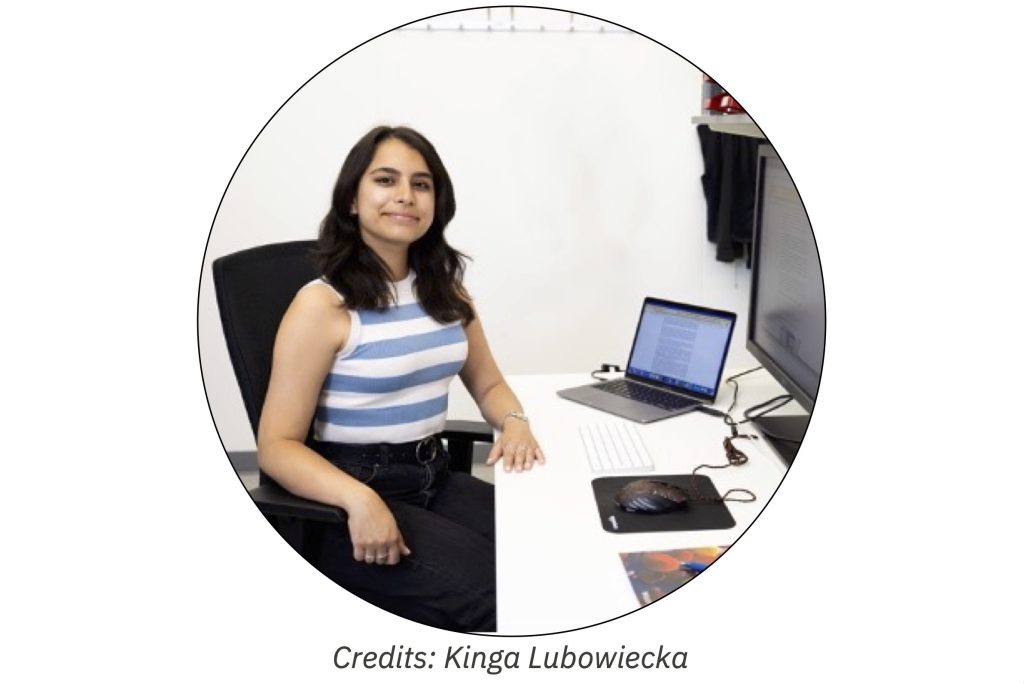
I find EMBL an ideal place for doing a PhD. […] There is also a lot of support for career development, through complementary courses or individual career guidance sessions.
Hosna Baniadam
Predoctoral Fellow in Huber Group, EMBL Heidelberg – Genome Biology Unit
(Background in Bioinformatics)
I am a PhD student in the Huber group in the Genome Biology Unit in Heidelberg. I study the drug perturbation landscape of blood cancers. I heard about EMBL for the first time in one of my bioinformatics courses. When the time came for applying for a PhD, I decided to apply to the EMBL International PhD Programme because I was particularly interested in studying human diseases through multimodal omics data and knew that several groups in EMBL did top-notch research in this field.
I find EMBL an ideal place for doing a PhD. The EMBL PhD programme offers a 10-week course in the beginning of the PhD which is very useful for class cohesion and getting to know the research that is done in all of EMBL’s departments. There are several interdisciplinary research themes at EMBL. The research community is very young, diverse, and committed to collaborative research. There are several seminars every week which provide a lot of opportunity to engage in scientific discussions. The EMBL bio-IT department provides various courses in programming, statistics, and data management which is of great value for bioinformaticians. There is also a lot of support for career development, through complementary courses or individual career guidance sessions.
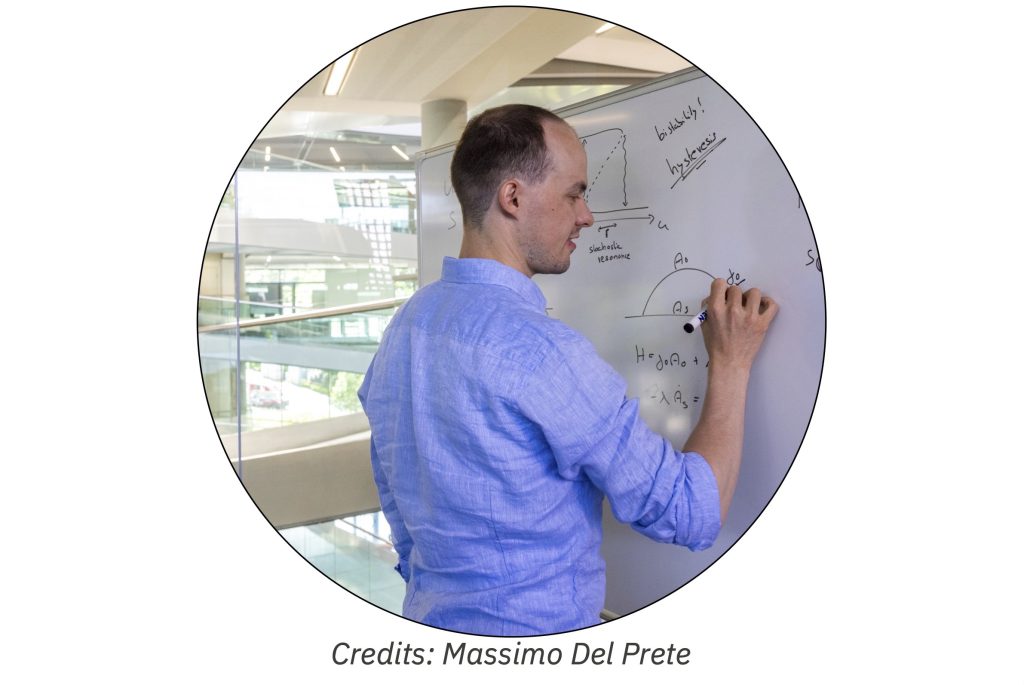
At EMBL, I appreciate the high density of young and highly motivated scientists from diverse research fields including biologists, chemists, physicists, mathematicians, informaticians and engineers.
Tim Dullweber
Predoctoral Fellow in Erzberger Group, EMBL Heidelberg – Cell Biology and Biophysics Unit
(Background in Physics and Molecular Medicine)
The idea to combine putatively disconnected scientific fields has always intrigued me as I believe fundamentally new discoveries can arise from it. This led me to acquire university degrees from two disciplines – physics and molecular medicine. Driven by the same motivation, I joined the EMBL PhD program in 2020 because of its strong interdisciplinary focus.
Our group, the Erzberger lab, consists of theoretical physicists and mathematicians and we use methods from statistical and non-equilibrium physics to understand emergent phenomena across various spatial scales – from the subcellular to the organismal level. In collaboration with experimental scientists in and outside of EMBL, we follow an integrative approach combining theoretical predictions and experimental observations.
At EMBL, I appreciate the high density of young and highly motivated scientists from diverse research fields including biologists, chemists, physicists, mathematicians, informaticians and engineers. The EMBL community fosters a truly collaborative spirit that encourages stimulating debates and invites to take part in innovative projects combining cutting-edge dry and wet lab technologies. Thanks to the many conferences, retreats and events organised at EMBL I had the chance to engage in many inspiring scientific discussions that have sparked several ideas for new collaborations.
As a theoretical physicist, the recently launched transversal theme “Theory@EMBL” motivated me to apply to the programme as it underlines the current efforts to extend the theoretical research at EMBL. I am excited to see further theory-minded scientists joining our institute in the future.
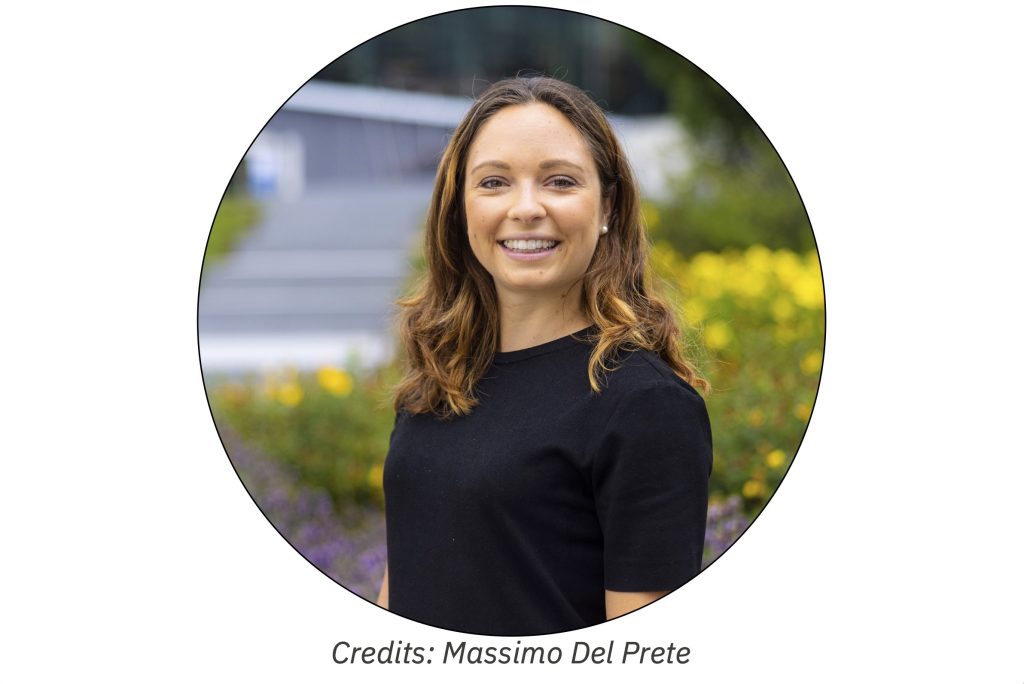
On a Friday afternoon, I make the short trip to EMBL for the weekly Beer Session to network with PhDs from my cohort, whom I established close relationships with.
Josephine Brysting
Predoctoral Fellow in group of Carsten Mueller-Tidow and Judith Zaugg, Molecular Medicine Partnership Unit
(Background in Human Biology and Biotechnology)
I was recruited as a PhD Fellow in the Spring 2021 cohort in one of the eight research groups within the Molecular Medicine Partnership Unit (MMPU). In my case, the MMPU research group brings the Zaugg Group at EMBL together with Müller-Tidow Group at the University Hospital Heidelberg (UKHD) to study stem cell niche networks in haematological malignancies, specifically acute myeloid leukaemia (AML). With this rich research ecosystem, we can harness state-of-the art tools to drive novel molecular insights in AML studied from patient samples and this is why I was attracted to this Unit.
My experience thus far has revealed even further advantages; I receive training from both basic scientists at EMBL, as well as clinician scientists at UKHD who provide different research perspectives, resulting in a contextualised learning experience. From the practical perspective, I enjoy the beauties of the Heidelberg Neckar River on my daily commutes to/from the clinic, where I am primarily based. On a Friday afternoon, I make the short trip to EMBL for the weekly Beer Session to network with PhDs from my cohort whom I established close relationships with during the 10-week predoc course. Of note, this course was essential for establishing familiarity with research groups, research techniques, and making friendships that last a lifetime.
Needless to say, balancing the inherently different communication styles, meetings and day-to-day practices here can be daunting at first. But with a proactive attitude, trust, and an open mind, you are bound to be successful.
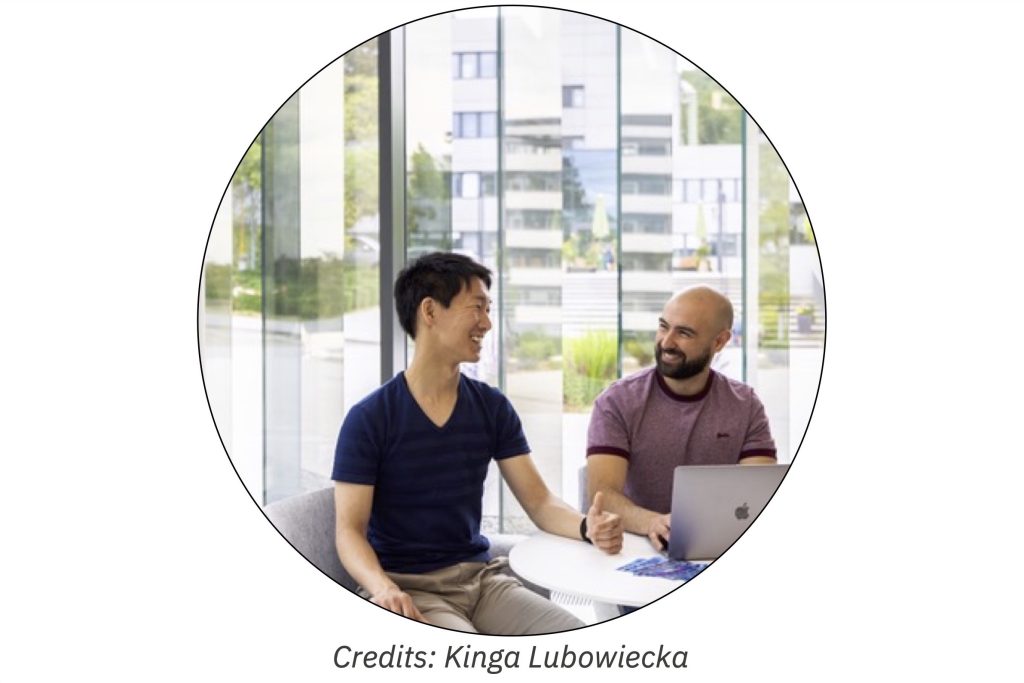
Throughout the application and recruitment process, I strongly felt that the culture of the EMBL, characterised by its openness, respectfulness, and interdisciplinary collaborations, is what I have been looking for.
Sora Matsumoto
Predoctoral Fellow in Saka Group, EMBL Heidelberg – Genome Biology Unit
(Background in Medical Science)
Throughout the application and recruitment process, I strongly felt that the culture of the EMBL, characterised by its openness, respectfulness, and interdisciplinary collaborations, is what I have been looking for.
So far, I have had a fantastic time at EMBL, exceeding my expectations. I have never had any difficulties in discussing scientific problems with senior or more experienced researchers, even outside of the lab or the research unit. This is because everyone in EMBL is eager to help others, and there are plenty of opportunities to communicate with EMBL people on scientific and non-scientific topics. There are research seminars every day, beer sessions every Friday, and various other group activities such as football and board game clubs. As a PhD student, I also participated in predoc courses where I was introduced to a variety of research topics done at the different EMBL sites. Furthermore, throughout these courses, I got to know people who I can turn to for advice on my PhD project.
I was also impressed with how EMBL scientists work efficiently, whilst maintaining a good work-life balance. The key I found is discussing science with many researchers from different backgrounds to get help and inspiration, and I am sure the EMBL provides the ideal environment for this.